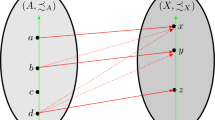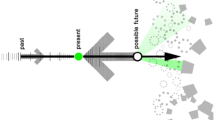Abstract
We suggest that developing automata theoretic foundations is relevant for knowledge theory, so that we study not only what is known by agents, but also the mechanisms by which such knowledge is arrived at. We define a class of epistemic automata, in which agents’ local states are annotated with abstract knowledge assertions about others. These are finite state agents who communicate synchronously with each other and information exchange is ‘perfect’. We show that the class of recognizable languages has good closure properties, leading to a Kleene-type theorem using what we call regular knowledge expressions. These automata model distributed causal knowledge in the following way: each agent in the system has a partial knowledge of the temporal evolution of the system, and every time agents synchronize, they update each other’s knowledge, resulting in a more up-to-date view of the system state. Hence we show that these automata can be used to solve the satisfiability problem for a natural epistemic temporal logic for local properties. Finally, we characterize the class of languages recognized by epistemic automata as the regular consistent languages studied in concurrency theory.
Similar content being viewed by others
References
Baltag, A., Moss, L. S., & Solecki, S. (1998). The logic of public announcements, common knowledge, and private suspicions. In Proceeding of the theoretical aspects of rationality and knowledge (pp. 111–121). Morgan Kaufmann.
Chandy K. M., Misra J. (1986) How processes learn. Distributed Computing 1(1): 40–52
Diekert V., Muscholl A. (1993). Deterministic asynchronous automata for infinite traces. LNCS 665: 617–628
Diekert, V., Rozenberg, A. (eds) (1995) A book of traces. World Scientific, Singapore
Fagin R., Halpern J., Moses Y., Vardi M. (1995) Reasoning about knowledge. M.I.T. Press, Cambridge
Fischer, M. J., & Immerman., N. (1986). Foundations of Knowledge for Distributed Systems. In Proceedings of the theoretical aspects of reasoning about knowledge (pp 171–185). Morgan Kaufmann.
Halpern J., Moses Y. (1990) Knowledge and common knowledge in a distributed environment. JACM 37(3): 549–587
Halpern J., Van Der Meyden R., Vardi M. (2004). A complete axiomatization of a logic of knowledge and time. SIAM Journal on Computing 33: 674–703
Krasucki, P., & Ramanujam, R. (1994). Knowledge and the ordering of events in distributed systems. In Proceedings of the theoretical aspects of reasoning about knowledge (pp 267–283). Morgan Kaufmann.
Ladner, R. E., & Reif, J. H. (1986). The logic of distributed protocols. In Proceedings of the theoretical aspects of reasoning about knowledge (pp. 207–222). Morgan Kaufmann.
Mazurkiewicz A. (1989) Basic notions of trace theory. LNCS 354: 285–363
Ochmanski E. (1985) Regular behaviour of concurrent systems. Bulletin of the EATCS 27: 56–67
Pacuit, E., & Parikh, R. (2004). The logic of communication graphs. DALT, 256–269.
Parikh R., Ramanujam R. (1985) Distributed processes and the logic of knowledge. Logic of Programs 193: 256–268
Parikh R., Ramanujam R. (2003) A knowledge based semantics of messages. JOLLI 12(4): 453–467
Ramanujam R. (1995) A local presentation of synchronizing systems. In: Desel J. (eds) Structures in concurrency theory. Springer Workshops in Computing, Berlin, pp 264–278
Ramanujam, R. (1996). Local knowledge assertions in a changing world. In Proceedings of the theoretical aspects of rationality and knowledge (pp. 1–17). Morgan Kaufmann.
Ramanujam, R. (1996). Locally linear time temporal logic. In Proceedings of the IEEE logic in computer science, pp. 118–127.
Thomas W. (1990) Automata on infinite objects. In: van Leeuwen J. (eds) Handbook of theoretical computer science, vol. B. Elsevier, Amsterdam, pp 133–191
van Benthem J., van Eijck J., Kooi B. (2006) Logics of communication and change. Information and Computation 204(11): 1620–1662
van Benthem, J., Gerbrandy, J., & Pacuit, E. (2007). Merging frameworks for interaction: DEL and ETL. In Proceeding of the theoretical aspects of rationality and knowledge (pp. 72–81). Morgan Kaufmann.
van Benthem, J., Gerbrandy, J., Hoshi, T., & Pacuit, E. (2009). Merging frameworks for interaction. to appear in Journal of Philosophical Logic.
van Benthem, J., & Pacuit, E. (2006). The tree of knowledge in action: Towards a common perspective. Advances in Modal Logic, pp. 87–106.
van Eijck J., De Vries F. -J. (1995) Reasoning about update logic. Journal of Philosophical Logic 24(1): 19–45
Van Ditmarsch H., van der Hoek W., Kooi B. (2007) Dynamic epistemic logic. Springer, Netherlands
Vardi, M. Y., & Wolper., P. (1986). An automata-theoretic approach to automatic program verification. In Proceedings of the first symposium on logic in computer science (pp. 138–266). Cambridge.
Veltman F. (1996) Defaults in update semantics. Journal of Philosophical Logic 25: 221–261
Zielonka W. (1987) Notes on finite asynchronous automata. RAIRO-Inform Theoretical Informatics and Applications 21: 99–135
Author information
Authors and Affiliations
Corresponding author
Rights and permissions
About this article
Cite this article
Mohalik, S., Ramanujam, R. Automata for Epistemic Temporal Logic with Synchronous Communication. J of Log Lang and Inf 19, 451–484 (2010). https://doi.org/10.1007/s10849-009-9118-5
Published:
Issue Date:
DOI: https://doi.org/10.1007/s10849-009-9118-5




